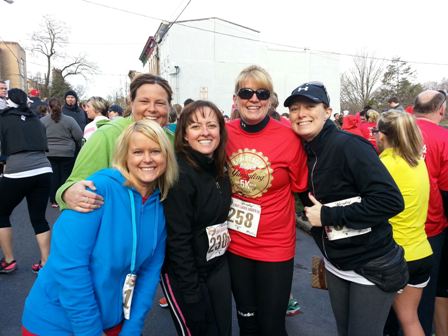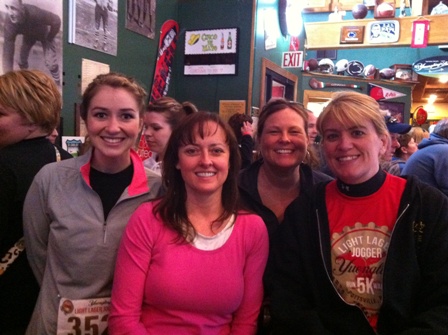On Saturday, April 13, staff from O’Connor Law laced up their running shoes to participate in the first ever Yuengling Light Lager Jogger 5K run/walk in Pottsville. Sponsored by America’s oldest brewery, Yuengling, the run/walk attracted 2,500 participants as well as hundreds of spectators. But it wasn’t just a chance to run or walk the race route — part of the proceeds from the participant registrations were donated to Operation Gratitude, an organization that sends care packages with snacks, entertainment items, and personal letters of appreciation addressed to individually named U.S service members deployed in hostile regions, as well as their children left behind, and to Wounded Warriors, veterans, and first responders. After the race, letter writing stations were set up so participants and spectators could write notes to be included in the care packages. It was a great community event that we were proud to take part in!

Pictured above from left to right: Mary Jo Link, Lorianne Link, Kathy Wagner, Bridget Burke, and Peggy Kellar

Pictured above from left to right: Samantha Cody, Kathy Wagner, Lorianne Link, and Bridget Burke
Jobs to Be Added at Local Home Care Company
There is good news this week for elderly residents of Schuylkill County who are in need of elder care but want to stay in their own homes: the Home Instead Senior Care office in Pottsville announced that it will be hiring 30 caregivers to its existing staff this year.
This is also welcomed news for residents of Schuylkill County who are looking for jobs, as the new positions will be part time with a flexible work schedule. In a press release, officials said this is “particularly good news for older Americans searching for second careers. Franchises anticipate mature workers will fill many of the job openings. Currently, about 30 percent of the network’s employees are 60 and older. Many part-time opportunities are available for those seeking to stay active professionally, at reduced hours.”
According to an article on the RepublicanHerald.com, this growth is a reflection of the increasing demand for home care professionals. The Bureau of Labor Statistics reports that the need for personal care aides is expected to grow by 70 percent from 2010 to 2020, which is much faster than the average for all other occupations.
In PA Adult Children Can Be Sued for Parent’s Nursing Home Bill
Earlier this month, The Mercury of Pottstown reported that in Pennsylvania, adult children could be sued for their parent’s nursing home bill after the PA Supreme Court declined to review the lower court decisions in the case of HCRA v. Pittas.
According to the article, the decisions were based on interpretation of the “filial support” laws here in PA. This law states that adult children are financially responsible for their indigent parents, although the word “indigent” is not defined.
In the Pittas case, Mr. Pittas’ mother went into a nursing home for rehabilitation after a car accident. She then moved to Greece, leaving almost $93,000 in unpaid nursing home bills. The court found that since Mr. Pittas’ mother did not have sufficient income to pay the nursing home bill, she was considered indigent. There was no evidence that Mr. Pittas took any of his mother’s money for himself, yet the Superior Court rejected his arguments that the courts should have considered other forms of payment, like his mother’s husband, her other two adult children, or Medicaid.
In the article, it mentions that other states have similar filial support laws, but none are used to the extent that they are here in Pennsylvania. Also, Pennsylvania’s laws authorize providers of care to bring law suits against adult children.
Thoughts and Prayers for Those at the Boston Marathon
Our thoughts and prayers go out to all those affected by today’s tragic events at the Boston Marathon.
New Study Reports that Costs of Care to Treat Dementia More Expensive Than Cancer or Heart Disease
This week the New England Journal of Medicine published a study that said the cost of treating Alzheimer’s and other forms of dementia is $109 billion, more than the cost of treating cancer or heart disease.
An article on CNN.com reported that according to the study, the costs will more than double in the next 27 years, reaching $259 billion by 2040.
According to the article, the costs of treating heart disease are $102 billion and the costs for cancer treatment are $77 billion.
Per dementia patient, the cost of formal care comes to an average of $33,329 each year. The costs highlight how expensive the disease is for society. In the article, Robert Egge, vice president for public policy for the Alzheimer’s Association, is quoted as saying, “It’s expensive because of how long people live with the disease, and the intense care that’s required as they progress further and further into Alzheimer’s.”
Since 70% of dementia patients are eligible for Medicare, most costs fall on U.S. taxpayers, according to the study.
The study also points out that there are few successful therapies that can treat those suffering from dementia. But therapy can slow the onset of symptoms which can reduce costs. In fact, if treatment can push back the disease for an average of five years, it could eliminate about half the cost of care.
New Research Shows Patients Can Be Taken Off Antipsychotic Medication without Behavioral Consequences
There’s been much debate recently regarding the overmedicating of nursing home patients with dementia. But new research shows that it is safe to take most dementia residents off of antipsychotic drugs without behavioral consequences.
According to an article on McKnights.com, the Cochrane Dementia and Cognitive Improvement Group, part of the international healthcare research organization the Cochrane Collaboration, reviewed nine trials with 606 participants, most of them nursing home residents. The trials studied what would happen when patients with dementia were taken off antipsychotic medications.
The researchers found that it is generally safe and advisable to stop giving antipsychotic medication to patients with symptoms of dementia, including agitation, aggression, depression, wandering, and delusions. But one exception may be older patients who have had more severe neuropsychiatric symptoms (NPS). The study found that discontinuing antipsychotic medication has few or no negative effects and may improve verbal fluency.
Deadline for Low Income Home Energy Assistance Program Extended
Funding is still available for the Low Income Home Energy Assistance Program (LIHEAP), so the federal program’s deadline has been extended to April 26.
According to an article on the RepublicanHerald.com, LIHEAP provides financial assistance each year to low-income Pennsylvania families that meet its criteria. Families can use those funds to pay heating bills through a crisis exception program and a regular crisis program.
According to the Department of Public Welfare, the crisis exception program provides money if a heat source has been shut off or if a household is almost out of fuel. The regular crisis program provides funds in an emergency situation, such as lack of fuel, termination of utility service, danger of being without fuel and having a less than 15-day supply, having utility service being shut off within a 60-day time frame, and broken heating equipment or leaking lines.
Estate Sues Illinois Nursing Home Over Resident’s Death
Falls at nursing homes happen more frequently and repeatedly than we’d like to think, some with dire consequences. According to the Centers for Disease Control and Prevention (CDC), about 1,800 older adults living in nursing homes die each year from injuries related to a fall. Those who survive a fall can sustain hip fractures and head injuries than can result in permanent disability and reduced quality of life.
Take for example the case of a man in Glen Carbon, Illinois whose estate filed a suit against the nursing home where the man was staying, claiming that several falls led to the man’s death.
An article on TheTelegraph.com quotes the suit as alleging, “The cause of death was a subdural hematoma; said medical condition was a direct result of multiple falls by the decedent, at the facility.” The suit also claims that the man required rehabilitation and assistance with daily living, and that the facility failed to care for the man “in a manner which maintained and enhanced his dignity and quality of life.”
According to the CDC, one way to help prevent falls in nursing homes is by educating staff about fall risk factors and prevention strategies. They also suggest making changes in the nursing home environment to make it easier for residents to move around safely. Our loved ones should be protected and kept safe from falls while in the care of a skilled nursing facility.
Nursing Home Union Members Hope New Legislation Will Have a Positive Impact on Care
In our last post, we talked about a group of local nursing aides who expressed their concern about resident care by supporting the statewide nursing “Day of Action” that took place on March 21. In today’s post, we want to discuss an article that appeared in the Central Penn Business Journal (CentralPennBusiness.com) about three proposed bills that would increase regulations on Pennsylvania nursing homes.
The article discusses a report by Service Employees International Union (SEIU) Healthcare Pennsylvania that claims that almost 30 percent of Pennsylvania facilities analyzed did not spend at least 95 percent of their resident care Medicaid component amount on resident care costs in 2011. The union claims that not only are patients being shortchanged, but that workers are being affected by underfunding direct care, inadequate wages, and staffing.
The report also says that nursing homes generated more than $500 million in profits in 2011, with a total margin near the national level of 4.7 percent. Yet a 2012 survey of nursing home employees in Pennsylvania showed that 12 percent of workers have more than one job and 11 percent receive public assistance.
According to the article, the report said that 54 percent of workers say their facility is only sometimes adequately staffed, and 27 percent say their facility is never adequately staffed.
The three bills being proposed would require nursing homes to meet minimum level of nurse aide staffing, report turnover and staffing levels to the Department of Health, and spend a minimum amount of their Medicaid resident care per diem rate.
Local Nursing Home Staff Join “Day of Action”
A group of local certified nursing aides expressed their concern about resident care when they stood outside of Golden Living Center-York Terrace in Pottsville in Thursday in support of the statewide nursing “Day of Action.”
An article on the RepublicanHerald.com reports that thousands of nursing home workers who are members of SEIU Healthcare Pennsylvania took part in “the largest statewide nursing ‘Day of Action’ in the union’s history,” according to Amelia Abromaitis, director of communications at SEIU Healthcare Pennsylvania, Philadelphia. Their mission: to bring attention to improvements needed in resident care and the challenges they face on the job.
With their contract set to expire in the near future, Golden Living Center and the union have been negotiating a contract for certified nursing assistants (CNAs), licensed practical nurses (LPNs), dietary workers, laundry workers, and other union workers. For the union and its members, the goal of the negotiations will be fair and competitive wages and overtime provisions while still preserving quality patient care.
In the article, the workers expressed their concerns with patient care with comments such as “Weekends are terrible. We can use more staff.” Another worker said, “Our residents aren’t receiving the care they deserve or that they need and we’re working short staffed.”
 Pennsylvania Nursing Home Abuse Lawyer Blog
Pennsylvania Nursing Home Abuse Lawyer Blog












